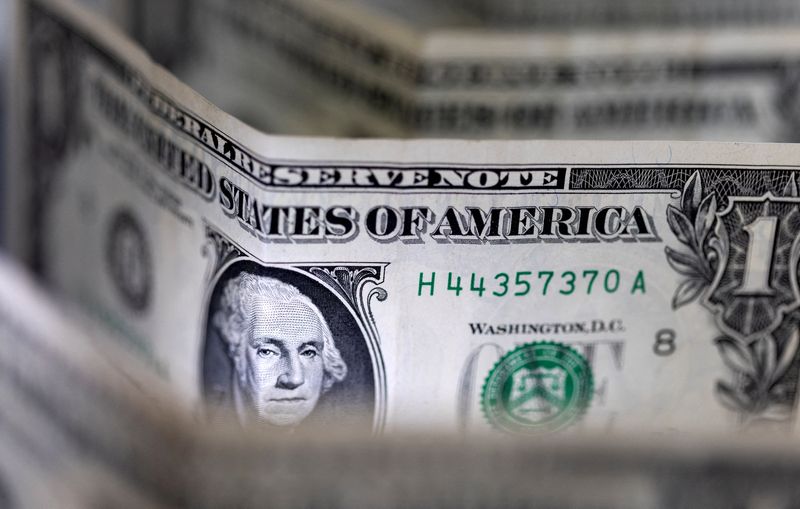 © Reuters
© Reuters
Investing.com - The U.S. dollar edged higher in early European trade Thursday, holding its ground after a rebound from sharp losses earlier in the week as traders digested recent economic data and the potential impact on thinking at the Federal Reserve.
At 03:30 ET (08:30 GMT), the Dollar Index, which tracks the greenback against a basket of six other currencies, rose 0.1% to 104.350.
The index suffered from volatile trading this week, gaining 0.3% on Wednesday following a 1.5% plunge the previous day.
Retail sales, spending bill help the dollar
The dollar drew support from better-than-expected retail sales numbers on Wednesday, after plunging as data showed cooling U.S. consumer prices raised doubts over whether the Federal Reserve would increase interest rates further in this particular cycle.
Also helping the U.S. currency was the news that the U.S. Senate passed a stopgap spending bill and sent it to President Joe Biden to sign into law before a weekend deadline.
“The release of US October retail sales failed to kindle this week's dollar bear trend and the Senate's support for a stopgap funding bill has removed the risk of a dollar bearish government shutdown at midnight on Friday,” said analysts at ING, in a note.
There is more data to digest Thursday, in the form of weekly jobless claims, industrial and manufacturing production for October, and the Philadelphia Fed manufacturing index for November, as well as a series of Fed speakers.
Euro looks to Lagarde for guidance
In Europe, EUR/USD edged lower to 1.0844, but remains near to its highest level since August seen earlier in the week.
There are several central bankers, including ECB President Christine Lagarde, set to speak at various events Thursday, and traders will be looking for further clues of their thinking regarding interest rates.
“Perhaps helping the euro this week has been the lack of key eurozone data. Over the last couple of months, eurozone data releases have pulled the rug from under any emerging EUR/USD rally and have emphasised the pessimism in this trading bloc,” ING added.
GBP/USD fell 0.3% to 1.2382, with sterling continuing to weaken after Wednesday’s data showed British inflation cooling by more than expected in October.
U.K. CPI plunged to 4.6% on an annual basis in October, from 6.7% in September, with the fall in the annual CPI rate the biggest from one month to the next since April 1992.
Despite this hefty drop, the Bank of England has warned that the "last mile" of getting it down will be tougher, forecasting that inflation will only return to its 2% target in late 2025.
Japanese yen on intervention watch
In Asia, USD/JPY traded flat at 151.36, weakening past the 151 level again following overnight strength in the dollar, which put traders on watch for any currency market intervention by the government.
USD/CNY rose 0.1% to 7.2533, with the yuan coming under pressure from data showing a sustained decline in Chinese house prices.

